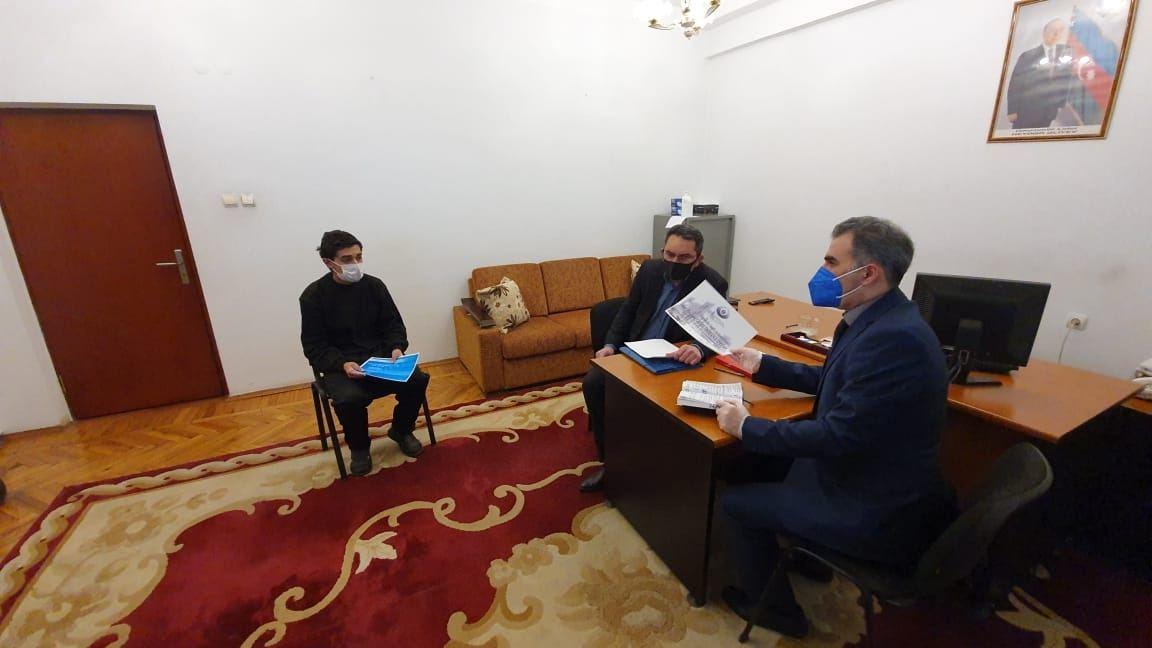Azerbaijani human rights officials visit Armenian POWs

By Vafa Ismayilova
Officials from the Azerbaijani Ombudsman's Office continue to visit temporary detention facilities at Human Rights Commissioner Sabina Aliyeva's instruction, the ombudsman's office has reported.
The visits by members of the office's national preventive group for the prevention of tortures are aimed at getting acquainted with the detention and treatment conditions of detainees and captives, and the ensuring of their rights.
During the latest visit, captives and hostages from Armenia were individually received, their appeals were heard, their rights were explained to them in their language, and legislative acts on their rights were presented.
Armenian prisoners of war and detainees underwent medical examination with the participation of a member of the preventive group. It was noted that they are being provided with the necessary medical and psychological assistance, in line with norms of international humanitarian law, especially the provisions of the Geneva Conventions.
Armenian prisoners of war and detainees expressed satisfaction with the conditions of detention, medical care, food, humane treatment of them.
As part of on-site visits, the condition of Armenian prisoners of war and detainees is being checked and their rights are being ensured at Ombudsman Sabina Aliyeva's instruction.
The Azerbaijani ombudsman office stated that Armenia doesn’t show the same attitude towards detained Azerbaijani civilians, as well as wounded and captured military personnel. When treating them, the norms of international law, in particular the requirements of the Geneva Conventions, are seriously violated.
The conflict between the two South Caucasus countries began in 1988 when Armenia made territorial claims against Azerbaijan. As a result of the ensuing war, Armenian Armed Forces occupied 20 percent of Azerbaijan, including the Nagorno-Karabakh region and seven surrounding districts. The 1994 ceasefire agreement was followed by peace negotiations.
On November 10, Baku and Yerevan signed a Russia-brokered agreement to end fighting and work towards a comprehensive solution.
Azerbaijani President Ilham Aliyev hailed the agreement as a victory for his country and a defeat for Armenia, saying Baku's military success enabled it to gain an upper hand to end the three-decade occupation of its territory.
Under the agreement, Yerevan and Baku have to exchange bodies of dead servicemen and also prisoners and hostages.
2,783 Azerbaijani servicemen, who fought for the country's territorial integrity, were killed in 2020 Nagorno-Karabakh war.
The work to identify 103 servicemen through the DNA analysis is underway. More than a hundred Azerbaijani servicemen are considered missing. The necessary measures are being taken to identify them and inform their families. Presently, 1,245 Azerbaijani servicemen are being treated in hospitals, the ministry said on December 3.
Ninety-four Azerbaijani civilians have been killed and hundreds of others have been injured in Armenia's armed attacks during the 44-day war.
The Azerbaijani army liberated several cities and nearly 300 of its settlements and villages as well as some strategic heights from the occupation of Armenian forces.
About 20 per cent of Azerbaijan's territory – including Nagorno-Karabakh and seven adjacent regions – had been under Armenian occupation for nearly three decades.
Armenia failed to implement four UN Security Council resolutions that urged the immediate and unconditional withdrawal of the invading forces from the occupied territories.
--
Follow us on Twitter @AzerNewsAz
Here we are to serve you with news right now. It does not cost much, but worth your attention.
Choose to support open, independent, quality journalism and subscribe on a monthly basis.
By subscribing to our online newspaper, you can have full digital access to all news, analysis, and much more.
You can also follow AzerNEWS on Twitter @AzerNewsAz or Facebook @AzerNewsNewspaper
Thank you!
